

AWS Lambda. The code you run on AWS Lambda is called a “Lambda function.”
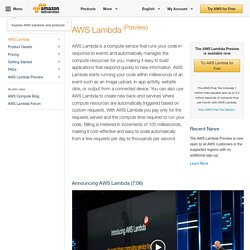
After you create your Lambda function it is always ready to run as soon as it is triggered, similar to a formula in a spreadsheet. Each function includes your code as well as some associated configuration information, including the function name and resource requirements. Solve New York: Docker Examines The Future Of Applications. The time has come to change the way we create, develop and ship applications.
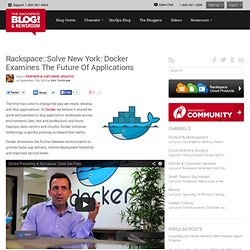
At Docker, we believe it should be quick and painless to ship application workloads across environments (dev, test and production) and hosts (laptops, data centers and clouds). Docker container technology is quickly pushing us toward that reality. The Ghost Blog. Today we are very proud to announce the first public release of the Ghost blogging platform to the public.
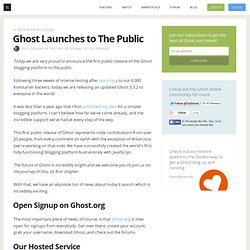
Following three weeks of intense testing after launching to our 6,000 Kickstarter backers, today we are releasing an updated Ghost 0.3.2 to everyone in the world. It was less than a year ago that I first published my idea for a simpler blogging platform. I can't believe how far we've come already, and the incredible support we've had at every step of the way. This first public release of Ghost represents code contributions from over 20 people, from every continent on earth with the exception of Antarctica (we're working on that one). We have successfully created the world's first fully functioning blogging platform built entirely with JavaScript.
The future of Ghost is incredibly bright and we welcome you to join us on the journey of this, its first chapter. Rackspace Buys MongoDB Hosting Provider ObjectRocket. Luvit: Showing Promise for Lua. Luvit is an attempt to do something crazy by taking node.js’ awesome architecture and dependencies and seeing how it fits in the Lua language.
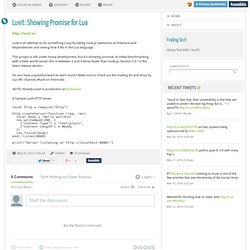
This project is still under heavy development, but it’s showing promise. In initial benchmarking with a hello world server, this is between 2 and 4 times faster than node.js. Version 0.3.1 is the latest release version. Do you have a question/want to learn more? Make sure to check out the mailing list and drop by our IRC channel, #luvit on Freenode. NOTE: Already used in production at Rackspace A Sample Luvit HTTP Server local http = require("http") http.createServer(function (req, res) local body = "Hello world\n" res:writeHead(200, { ["Content-Type"] = "text/plain", ["Content-Length"] = #body }) res:finish(body) end):listen(8080) print("Server listening at. The Rackspace Cloud Powered By OpenStack. When I joined Rackspace nearly two years ago, the thought of working with a community to build an open cloud platform seemed almost Utopian.
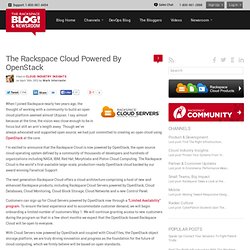
I say almost because at the time, the vision was close enough to be in focus but still an arm’s length away. Though we’ve always advocated and supported open source, we had just committed to creating an open cloud using OpenStack at the core. I’m excited to announce that the Rackspace Cloud is now powered by OpenStack, the open source cloud operating system defined by a community of thousands of developers and hundreds of organizations including NASA, IBM, Red Hat, Morphlabs and Piston Cloud Computing. The Rackspace Cloud is the world’s first available large-scale, production-ready OpenStack cloud backed by our award winning Fanatical Support.
Customers can sign up for Cloud Servers powered by OpenStack now through a “Limited Availability” program. The Rackspace Cloud Portfolio Today signifies a new beginning – open clouds are here. The Official Rackspace Blog. At Rackspace, we’ve been busy for the last 6 months getting ready for IPv6. We’ve spoken to our customers and our partners about industry impact and what it means to be IPv6-ready. We’ve collaborated across network, product, IT, security, monitoring, supply chain, sales and support teams to make sure we’ve covered all aspects of the customer experience. 160 days after we started, we are pleased to announce that we are ready to accept customers’ IPv6 requests for the following products: • Private Cloud • Critical Sites • Dedicated server configurations (Servers, Firewalls, Load Balancers, etc) • Cloud Sites • Email & Apps • Cloud Files • Cloud Load Balancers. The Official Rackspace Blog. Contributed by Product Managers Rob Jackson and Ed Conzel. We want to keep our entire customer base as informed as possible about IPv6, so we will be posting Q&As and announcements both here and on the Rackspace IPv6 Deployment & Readiness Headquarters site.
From the time we initially started talking about IPv6, to our last roadmap update, we’ve already heard from many of you directly, and your questions are very helpful, so please keep them coming. Question: How long will Rackspace run IPv4, before transitioning completely to IPv6? Answer: Offering IPv4 is essential for our customers to connect to IPv4 end-users. Given the worldwide depletion of IPv4, Rackspace is working to sustain our own IPv4 space so that we can continue to provide IPv4 addresses to customers who have technical justification. In terms of the IPv6 transition, our deployment strategy is to offer dual stack (both IPv4 and IPv6) globally across our data centers starting in mid-June.